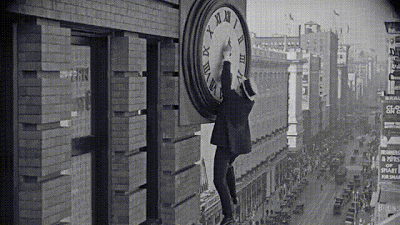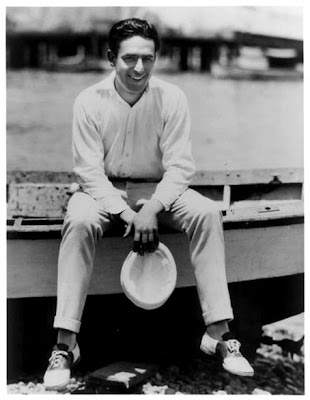The Glass Character: an excerpt (the glove scene)
My third novel The Glass Character is a fictional account of a young girl’s experiences in
The story:
Muriel Ashford, a. k. a. Jane Chorney is working as an extra in a Harold Lloyd movie and will do anything to be close to him. Lloyd's right hand was badly injured in an explosion at the start of his career in 1919. In this scene, Muriel comes upon him preparing his prosthetic right hand before facing the camera.
One day while I was trying to find a hat I
was supposed to wear in the next scene (a hat with a veil, meaning my face
would be totally obscured: what a great opportunity for an unknown actress like
myself!), I stumbled upon Harold preparing himself to become the Glass
Character.
He was usually quite secretive about this,
so I was taken aback that he was dressing in the prop room. His character was
only half there, still wearing the white pants he often wore on the set. His
sweater was off, revealing a hard but hairless chest. Once again, without his
glasses, I had the impression of a much-better-looking Douglas Fairbanks: all
that was missing were the riding breeches and the self-important smile.
He was at a quarter turn with his back to
me, and didn’t hear me at first. I began to literally walk backwards, knowing I
should not be there, but unable to stop looking at him. Then, stupidly, I ran
into a large metal pole (what was that doing there?), banging my head hard. My
scalp began to smart so much that tears rushed into my eyes. At the metallic
ringing noise, he started, suddenly turning around.
For half a second I saw confusion, even
alarm in his eyes. Then he quickly covered it with his usual smiling
graciousness: “No, no, come in, Muriel. (He knew my name?) I’m just
getting ready.”
“I’m sorry, I didn’t mean. . .”
“It’s all right, don’t be.”
There was something strange about Harold’s
eyes. You couldn’t get away from them. But he was so pleasant most of the time
(I had never been at the receiving end of one of his famous explosive tirades)
that you wondered if you were imagining it. His eyes tugged hard, drew you in
as if you were being pulled on a chain. I gave way to the tug, and stood shyly
while he fiddled with his prosthetic glove.
All the while he talked to me in the most
flattering way, asking about where I had come from, how it felt to be working
in movies, about my aspirations. I am
afraid my responses were stilted and not very truthful. The fact was, I wanted
to be Mary Pickford, and fast. This sitting in the background reacting as a
choir with two dozen pretty but untalented girls was wearing thin. Most days I
did not even see Harold.
While he worked at the glove, which had to
fit as tightly as a second skin, I saw what was left of his right hand. I was
very surprised that he would allow me to see this, though I knew he did not
wear the prosthesis in public, rightly believing that hiding it would only make
it more apparent. Oddly enough, maybe due to his magician's sleight-of-hand, nobody ever seemed to notice it.
I had assumed there would be some vestige
of thumb and forefinger left, but they were sheared off clean, with half the
palm gone. Later I was to find out that the doctors had to keep removing tissue
to prevent gangrene.
The glove was hardly just a glove. That was only the part that showed. What held it on was a tightly-wound bandage reaching all the way up to his elbow. At times the edge of that bandage showed just past his cuff, but the primitive cameras of the day did not reveal it.
When the glove was on, he held both hands out in front of him.
When the glove was on, he held both hands out in front of him.
“Quite a sight, eh?” he said, with a little
Harold smile. Not a trace of self-pity. There were certain emotions he simply
would not harbour.
“So what do you think?” It was an
impossible question, even a bit cruel. What was I supposed to say?
“It looks fine, Mr. Lloyd. I’m grateful you
recovered so well.”
“Please – “
I knew what he meant.
I knew what he meant.
I fought to get the word out. “Harold.”
He gazed at me a moment with a speculative
look. I allowed myself to wonder if he was going to kiss me, or do worse, which
seemed to be his way of breaking in new girls. But I knew I was too far down in
the pecking order (so to speak) to receive this kind of favour.
“Muriel, would you do something for me?”
In my heart, I said: anything, Harold. Anything.
In my heart, I said: anything, Harold. Anything.
“Would you dance with me?”
My heart dropped. Dance, as in the
razz-ma-tazz contests he and Bebe Daniels used to win almost every night with
their fire-breathing versions of the Charleston
“I – don’t know what you - “
“Like this.” He reached out with his good
hand, touched my shoulder, drew me to him very gently.
My head reeled. I could smell his white
makeup, the pomade in his hair. He pulled me into his orbit, and propelled me
around so lightly that I soon forgot my utter incompetence on the dance floor.
I was reminded of Arab sheiks who controlled their steeds with a silk thread.
This close, I could feel his radiant body
heat. Harold wasn’t very tall (he had fought as a bantam-weight in his youth),
so we were almost the same height, and at one point his forehead lightly bumped
against mine.
We slow-danced (as slowly as Speedy could
ever slow-dance) for one complete turn around the room. Thank God it was early
enough that no one came in.
Then he put me away from him. Did not step
back, did not push me, but put me away.
“Thanks, Muriel. Just wanted to see if I
could still do it.”
“You can do anything.” As soon as the words
had escaped, I knew I had gone much too far.
(CODA. It's rare to find a photo of Lloyd without his prosthesis, but a couple of them do exist. In this one he is bowling with a custom-made ball to be used with three fingers.)
http://margaretgunnng.blogspot.ca/2013/04/the-glass-character-synopsis.html
http://margaretgunnng.blogspot.ca/2013/04/the-glass-character-synopsis.html























































